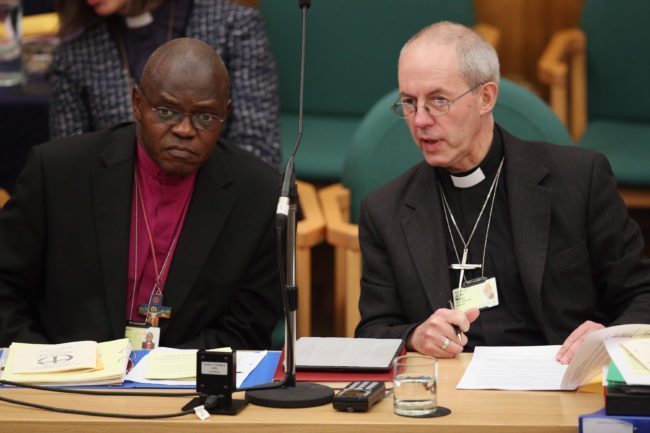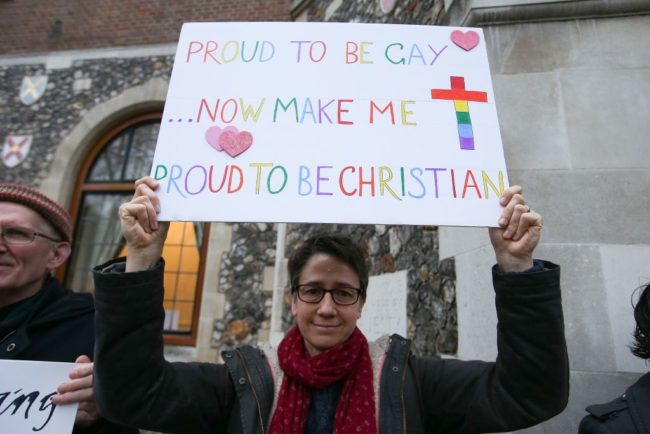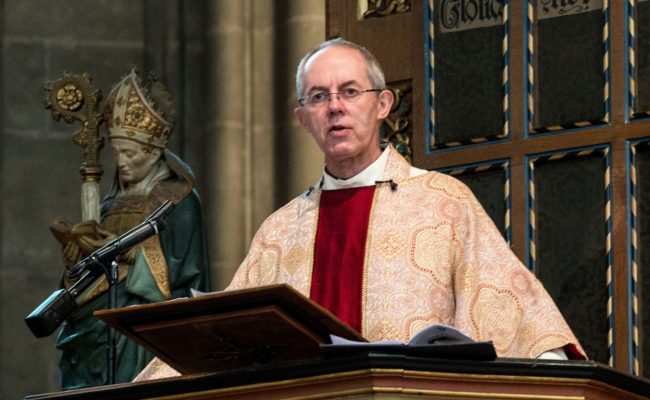A secular response to the Church of England’s statement on the partial decriminalisation of homosexuality

Last month, PinkNews published a statement from the Archbishop of Canterbury Justin Welby and Archbishop of York John Sentamu to mark the 50th anniversary of the partial decriminalisation of homosexuality.
Below is a response from Keith Porteous Wood, Executive Director of the National Secular Society.
The statement from the Archbishops that you published recently has been greeted with well-deserved cynicism by many of your readers.
That is understandable when the Archbishops’ statement, mostly couched in religious language with concepts that will be meaningless to 90 per cent of gay people, somehow omitted to mention that Church doctrine still holds that same-sex intimacy, even within a committed relationship, is sinful and “is to be met by a call to repentance”.

The Archbishops of York and Canterbury (Oli Scarff/Getty Images)
It also omitted any acknowledgement of, or remorse for, the gratuitous hurt and indeed persecution of LGBTI+ people that Christianity has been responsible for over the centuries.
The Archbishops state that “Diminishing and criminalising homosexual people is wrong”, hardly setting the bar very high. And there is at least one member of the Church’s General Synod (or its “parliament”) who is working internationally with other Christians to retain such criminalisation in other countries.
There was no mention of equal civil rights or for statutory protection of LGBTI+ people from discrimination; does the Church not think these to be important or even relevant?
The Archbishops mentioned, and I happily acknowledge, that the Sexual Offences Act 1967 was supported by the Archbishop of Canterbury of the time, Michael Ramsay.
I am convinced however that Church support for reducing gay oppression and discrimination has diminished since then. That is certainly the impression from gay clergy and their partners. I remember one such partner telling me ten years ago he couldn’t take out the dog in case parishioners recognised it, and hence guessed the nature of their relationship.
Since then the parishioners have become much more liberal but illiberal clergy and bishops have become much more entrenched and outspoken. And gay clergy in lawful same sex civil marriages have been barred from jobs.

Demonstrators hold placards as they protest outside Church House (Daniel Leal-Olivas/AFP/Getty Images)
There was not one vote in favour from the Bench of Bishops in the House of Lords of the same-sex marriage bill in 2013. (Let’s ignore for the moment the strange anachronism of bishops being entitled to parliamentary votes as of right, something – wisely – no other country countenances.)
Given that the Bill effectively outlawed CofE religious marriages, that vote was about whether to legalise civil (non-religious) same-sex marriages and marriages conducted by other faith groups that wanted to celebrate them.
Why should the CofE hierarchy feel entitled to veto not just popular opinion and even the majority of British Anglicans in order to deny those of all faiths and none a non-CofE marriage to the person they love? It was not as if the Act made same-sex marriage compulsory.
And not only did the bishops oppose the same-sex marriage Bill, according to the Church Times in 2013, they turned out in record numbers to support a “wrecking amendment” to it, just as by six to one they supported a wrecking amendment to the Civil Partnerships Bill. (Wrecking amendments normally remove bills altogether, depriving parliamentarians of the opportunity to debate them.)
And there have been warnings, e.g. a recent revolt Church in turmoil at Synod, and (former vicar) shadow minister Chris Bryant MP’s parting shot as he left the Church was that the Church’s “stance on homosexuality would one day look as wrong as supporting slavery”.

Archbishop of Canterbury delivers his Christmas sermon (Getty Images)
Also, the devastating Gibb report on jailed ex Bishop Peter Ball, in which the Church colluded in him evading justice for years, concluding that “the Church’s attitude to homosexuality at the time played a part in the failure to act appropriately.”
Despite all of this, there is still no appetite at the top for reform, far less leadership. Any change in doctrine has just been kicked into the long grass, doubtless regarded by the right-wingers in the Church as a triumph.
Why the intransigence? Maybe a clue lies in Dr Welby’s approving reference last year, not of course meant for a UK audience, that “the Bench of Bishops is described by the longer standing members as the most orthodox since WWII.”
This looks to many like the result of a deliberate long-term strategy, presumably led from the top. Wouldn’t a more equitable and indeed sustainable strategy for any church wishing to remain established as the national church (with all the privileges that come with it) to minimise divergence from the country’s mainstream culture and public morality?
All the above sits rather uncomfortably with the Archbishops’ article. They should be judged by their actions rather than their words. Their opposition to same-sex marriage looks ever more callous and pointless as more and more churches (including Anglican ones, as in Scotland) accept it.
I hope the archbishops will reflect on this and accept it now; the longer they hold out, the more humiliating will be the inevitable climb down.
Keith Porteous Wood, Executive Director, National Secular Society

